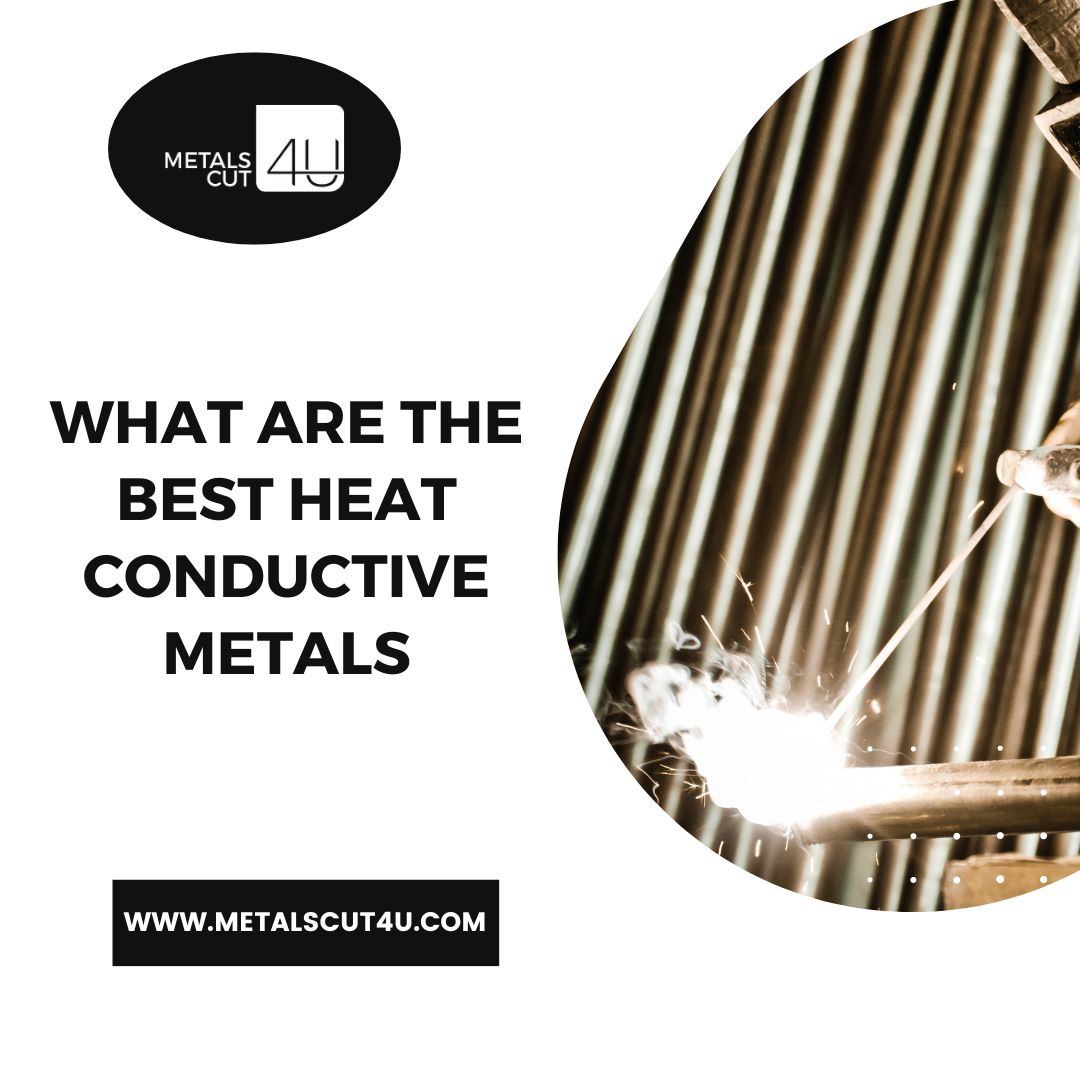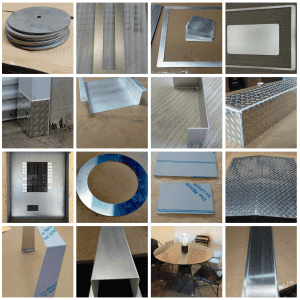What Are The Best Heat Conductive Metals?

Most electrical appliances used for our daily activities require a good amount of heat conductivity to operate efficiently. Heat conductivity helps metal appliances balance heat absorption levels and equally distribute heat for optimum performance. Poor and bad heat conductivity of metals can affect the durability and lifespan of your metal appliances and give rise to several unwanted situations.
Hence, when choosing metals for your business or personal use, it is vital to check the heat conductivity levels of your metal appliances. The heat conductivity measures differ from metal to metal based on their properties and specifications.
Generally, the heat conductivity of metals stays roughly the same in pure metals even with the increase in temperature. However, in certain alloys, the heat conductivity of metals expands rigorously with an increase in temperature.
In this article, we will walk you through everything that helps expand your knowledge and help you select the most suitable heat-conductive metals for commercial or personal use.
Let us begin this article by discovering some of the best heat conductors for various applications.
Top 9 Heat Conductive Metals
Choosing the right heat-conducting metals is one of the most crucial aspects of metal fabrication or commercial projects. Low-heat conductive metals cannot usually withstand greater pressure and end up getting damaged during the process. Similarly, choosing inappropriate heat conductive metals for personal use (cooking, water heater, and more ) might give rise to unwanted incidents in your home.
But which metal is the best conductor of heat?
Here are some of the top best heat conductors to choose from.
1. Silver
Silver is one of the best heat conductors of metal used in various applications across the globe. Silver contains more free electrons in its outer shelf, which aids in appropriate heat transfer across the entire appliance or metal object. It is one of the most suitable heat-conducting metals for transferring electrical energy and heat for different applications. It also has the highest thermal conductivity at room temperature compared to other metals on the list.
2. Copper
After silver, copper is one of the best conductors of heat with the second-highest thermal conductivity. Copper can absorb heat quickly and hold it longer than other metals. Along with that, copper is rust and corrosion-resistant metal that can be used for several appliances. Most manufacturers prefer copper to fabricate different types of cookware, computer applications, and heating systems. If you are looking for a versatile and lightweight metal, copper is the ultimate option for you.
3. Gold
Not many people know that gold is a good heat-conducting metal. Most manufacturers don’t prefer gold due to its high value in the market. Similar to silver, there is a good amount of free-electron in gold that makes energy transfer easily from one place to another. If money is not the primary factor or you would like to experiment with alloy metals, gold is the optimum option.
4. Aluminum
Aluminum is one of the world's most versatile and widely used metals. Aluminum is popular for its rust and corrosion resistance properties. It is a lightweight metal with good thermal conductivity commonly used for heat sinks and heat exchanger applications. However, it has lower thermal conductivity compared to copper and silver. Aluminum is a suitable metal for appliances constantly exposed to water and moisture and has a greater threat to corrosion.
5. Iron
Iron is known for its unique atomic structure and free electrons. It is commonly used in heat exchangers, radiators, and other heat transfer applications. However, iron alone can not withstand rust and corrosion and is often mixed with other types of metal to create an impactful and strong alloy metal. Iron is widely used in making vehicles, utensils, surgical tools, and more.
6. Nickel
Nickel is a relatively good heat conductor which is hard, malleable, magnetic at room temperature, and easily available. It is also a good conductor of electricity with valence electrons that are loosely bonded. It is because of the flow of delocalized electrons that helps nickel conduct heat and electricity, making a good conductor for heat as well as electricity. Also, nickel has a high thermal conductivity compared to most other metals available.
7. Brass
Brass is one of the toughest metals that can be heated to temperatures as high as 1720 degrees Fahrenheit. Brass is a copper-zinc alloy that makes it an excellent heat-conducting metal. Copper, being a good heat conductor pure metal, greatly influences brass’s heat conductivity levels. Copper helps brass increase its capacity to transfer heat quickly and efficiently for various electrical and heating applications. It is most suitable for making heat exchangers, radiators, and other heat transfer applications.
8. Tungsten
Tungsten is popular for its unique combination of physical and chemical properties. With a high melting point and low vapor pressure, tungsten is an ideal metal for making appliances exposed to high electricity levels. Tungsten is popularly used in making lightbulbs as a component of cathode ray tubes. It is vital to note that it is one of the strongest metals on the earth. It might require more resources and a fabrication process to make a desired heating appliance for your business projects.
9. Zinc
Compared to other metals, zinc has lower heat conductivity levels. However, it is one of the best and most convenient for beginners. If you are looking for the most suitable heat-conductive metals to experiment with your business project or learn different methods, zinc is an excellent choice. Zinc can get easily mixed up with any metals and require less energy to heat up quickly.
5 Factors Which Affect The Heat Conduction
Several factors are involved in the heating process that helps manufacturers reach their desired results. Depending on the properties of the metals and other factors, the heating method can differ from one metal to another. Here is a list of factors that can significantly affect the heating conduction of a metal.
1. Temperature difference
Temperature differences can majorly affect the heating conduction for most metals. Heat always transfers from hotter objects to colder objects. Hence, the greater the temperature difference between two objects, the faster the heat will transfer. To maintain proper flow of heat transfer, it is recommended to maintain an equal or appropriate flow of temperature. Avoid pairing low-heat conducting metals with higher conductivity ones.
2. Level of conductivity
Metals with higher heat conductivity is considered the most conductive metals. High-heat conducting metals have a greater ability to absorb and transfer heat than poor or low-heat conductive materials ( such as wood). Irrespective of the temperature, poor or low heat conductive materials can not transfer heat appropriately across the structure. Hence, it is vital to pair a heat-conductive metal with a heat-conductive material to achieve the desired results.
3. Material thickness
Heat takes more time to travel through thicker materials. Excessively thick material can create a huge hindrance in the heat conduction process and result in a waste of resources and effort. Ensure to measure the thickness of the metals or materials before starting with the heat conduction process. Along with the thickness, the metal properties and other specifications also play an imperative role in the entire process.
4. Surface area
The surface areas play the most crucial role in the heat conduction process. Metals or structures with large surface areas can transfer heat more appropriately than metals with small or limited surface space. Greater space offers more points of heat contact to transfer heat from one point to another.
5. Expose time
Lastly, the exposure time of the metal can either make or break the most out of your heat conduction process. Heating the metal more than the required time frame can compromise the original texture and properties of the metal. Ensure to calculate the time frame before placing the metals for the heat conduction process, pair the metals according to their properties, and constantly check the process for favorable results.
What is the most heat-resistant metal?
Titanium, tungsten, stainless steel, molybdenum, nickel, and titanium are the most heat-resistant metals on the earth. These metals can easily withstand the highest heating points. These metals have tough exterior and interior properties making them the strongest metals. Consider taking a small amount of these metals to experiment with their heating abilities.
What conducts heat the best?
Metals such as silver, copper, gold, iron, brass, aluminum, etc., are considered the best heat-conducting metals for various applications.
At MetalsCut4U, we offer tier-one quality metal fabrication services nationwide. To learn more about our services or book an appointment, call us at 440-822-6381 today!
